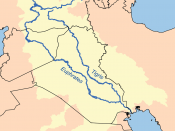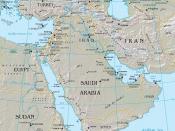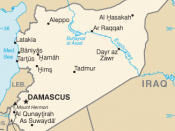Water is a ubiquitous resource, vital to support life, and therefore a prerequisite for peace and security in a region. The demand for water to serve the expanding Middle Eastern populations and burgeoning industries continue to increase, however, fresh-water supplies are finite, and it is becoming more and more difficult to utilize them on a renewable and sustainable basis. By nature, the Middle East is an arid region, with few major water sources that need to be shared among the various nations in the area. Most of the nations depend on non-renewable water sources, such as underground aquifers. Although social and economic, factors strongly affect the possibility of access to water, disputes over the water right in the banks of the rivers and lakes jointly shared by two or more countries and are not contained by international borders further complicate the water access problem. Developing a water treaty or agreement that meet all of the countries needs is a problematic and difficult process that needs the aid of the international community, in order for it to be possible.
Drawing a water treaty to ensure fair usage of the water in the Middle East is further complicated by the political tensions within the nations in the region. Many of these nations have hostile relationships with their neighbors, with whom the share their precious resources with. The international boundaries are not usually determined based on the provision of resources and therefore, in many cases, the distribution of water between the nations is unequal, resulting in inequitable distribution of water resources.
For example, the Tigris and the Euphrates are two of the few rivers that are considered large by international standards in the Middle East and are shared by several nations, including Turkey, Syria, and Iraq. The flow of the two rivers through...


